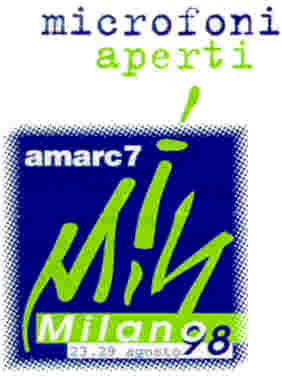amarc-3
[Date Prev][Date Next][Thread Prev][Thread Next][Date Index][Thread Index]
Re: <amarc-3> Section I of the Declaration
>Hi everyone:
>
>I'm sneaking into the discussion to say thanks to all the participants so
>far. I have been quietly observing and am very pleased with the substantial
>contributions that have been made towards the development of the Declaration.
Thanks to you Elvira, and everyone who contributed to the draft. The MD
draft sounds fine indeed. Linking this Declaration to those that have come
before it seems to be a good idea. Acknowledged earlier efforts ground our
voice in accepted traditions.
Is there the opportunity to add proposals about the specific mechanisms of
regulation and implementation? Or is this the wrong time and place for
that?
I can imagine mechanisms where by the MD could guide the World Bank to
stipulate that a certain percentage of loans and bonds be dedicated to
maintaining the culture, community and civic structures of communications
when supporting development projects. [If you want to build a damn or other
large civil engineering project, you have to internet the community it goes
into, if you want to build a library you must incorporate a community
broadcast center, if you want to . . .] We could also encourage nations
to stipulate that receipt of domestic funds and support be contingent on a
percentage of the funding and project being dedicated to the enhancement of
communications capacity and motilities.
I think we should propose the elimination, where existing and the outlawing
of artificial data tariffs, and impediments to cross cultural
(transnational) communications. In broadcasting there are technical limits
and the "toll" on radio waves is hard to collect, but on interneted data,
transmission, and broadcast transfers it could be very easy for countries,
states, and even local governments to erect artificial "toll" schemes. We
should anticipate this hurdle to communications and declare it unethical
and illegal. [Again link receipt of financial aid to the compliance of
governments to this practice of free and unhindered communications.]
There might also be some specific attention to government owned telephone
companies (telcos) and their effect on the freedom of communications. I
have seen instances where government owned telcos strangle participation in
online communities. This works both ways. Those under the telcos with
prohibitive rates and policies can't join a global community, and the rest
of the world is deprived of the views and contributions of those laboring
under the oppression of those telcos and governments.
I apologize if any of this is misplaced but the mechanics (and specifics)
of how this declaration will affect the practices of the world seem to be
critical to its impact. I suspect the rest of you have even better ideas
about how we might make the specifics and mechanics fit elegantly into the
MD.
Thanks,
Kevin
Kevin C. Facemyer, Ph.D.
Director of Digital Ekistics
A nonprofit organization
dedicated to studying and improving
communities via virtual ekistics
http://www.facemyer.org/Ekistics
[email protected]
"Paving a path toward tomorrow with
new technology and good intentions"
++++++++++++++++++++++++++++++++++
AMARC 7 Foro Virtual Forum Virtuel
http://www.amarc.org/amarc7
to unsubscribe / pour se desabonner / para abandonar :
e-mail "unsubscribe amarc-3 " to: [email protected]
Tecnical realisation, scripting and archiving: Worldcom
Foundation
English: [Virtual
Forum Index] [Search
Forum archives]
Français: [Index
du Forum Virtuel] [Chercher
dans les archives du Forum]
Español: [Índice
del Foro Virtual] [Buscar
en los archivos del Foro]
